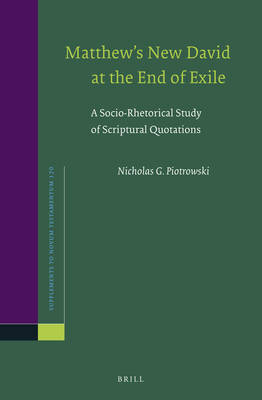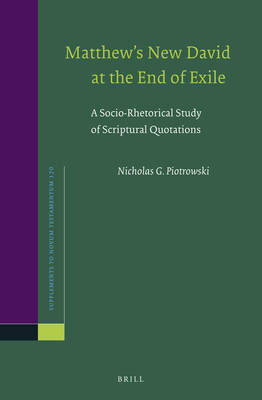
- Afhalen na 1 uur in een winkel met voorraad
- Gratis thuislevering in België vanaf € 30
- Ruim aanbod met 7 miljoen producten
- Afhalen na 1 uur in een winkel met voorraad
- Gratis thuislevering in België vanaf € 30
- Ruim aanbod met 7 miljoen producten
Zoeken
Matthew's New David at the End of Exile
A Socio-Rhetorical Study of Scriptural Quotations
Nicholas G Piotrowski
€ 221,45
+ 442 punten
Omschrijving
Matthew crowds more Old Testament quotations and allusions into the prologue than anywhere else in his gospel. In this volume, Nicholas G. Piotrowski demonstrates the narratological and rhetorical effects of such frontloading. Particularly, seven formula-quotations constellate to establish a redemptive-historical setting inside of which the rest of the narrative operates. This setting is defined by Old Testament expectations for David's great son to end Israel's exile and rule the nations. Piotrowski contends that the rhetorical effect of this intertextual storytelling was to provide the Matthean community with an identity--in a contentious atmosphere--in terms of God's historical design for the ages, now fulfilled in Jesus and his followers.
Specificaties
Betrokkenen
- Auteur(s):
- Uitgeverij:
Inhoud
- Aantal bladzijden:
- 340
- Taal:
- Engels
- Reeks:
- Reeksnummer:
- nr. 170
Eigenschappen
- Productcode (EAN):
- 9789004326781
- Verschijningsdatum:
- 15/09/2016
- Uitvoering:
- Hardcover
- Formaat:
- Genaaid
- Afmetingen:
- 155 mm x 236 mm
- Gewicht:
- 589 g

Alleen bij Standaard Boekhandel
+ 442 punten op je klantenkaart van Standaard Boekhandel
Beoordelingen
We publiceren alleen reviews die voldoen aan de voorwaarden voor reviews. Bekijk onze voorwaarden voor reviews.











